

Seven Faces of Information Literacy in Higher Education. Information literacy is usually described as the ability to locate, manage and use information effectively for a range of purposes.

As such it is an important ´generic skill´ which allows people to engage in effective decision–making, problem solving a nd research. It also enables them to take responsibility for their own continued learning in areas of personal or professional interest. Whilst there is growing advocacy for information literacy in higher education, comparatively little in known about how it is experienced by those who use information.
The various faces of information literacy described here are drawn from the experienc e of higher educators in two Australian universities. They provide a picture of information literacy that is very different from the lists of skills and attributes that are usually found in literature on the subject. Learning to be information literate could be seen as coming to experience using information in these ways. Information Literacy Weblog. L'École au défi de la culture informationnelle. Date : 29 mai 2008 Lieu : lycée agricole Fondettes (37) Intervenant : Alexandre Serres Alexandre Serres, maître de conférences en sciences de l'information et de la communication, URFIST de Rennes.
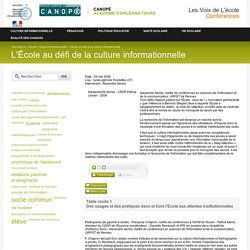
Trois défis majeurs pèsent sur l'École : celui de l' « innovation permanente » (par référence à Bernard Stiegler) face à laquelle l'École a obligatoirement du retard ; la crise de l'attention, et enfin celle de l'autorité, c'est à dire la remise en cause du monopole du savoir par des professionnels. Eric-Delamotte.pdf. De la culture de l’information à la culture informationnelle : au-delà du « penser, classer, catégoriser » ERTé Culture informationnelle. Professeur-documentaliste : Un tiers métier Le 15-09-2011 à 16:53 .
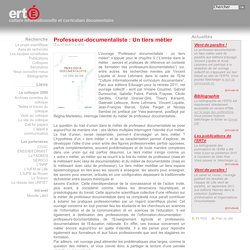
Une certaine vision de la culture informationnelle. Ce texte reprend et développe une intervention faite lors du séminaire « Enseignement et médias », organisé le 16 mai 2009 à Paris par Ars Industrialis, le CIEM et la revue Skhole.fr.
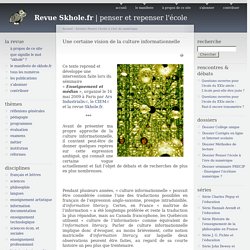
Éveiller l’élève à la culture informationnelle. « Homo numericus », « generation Y », « digital native », les expressions ne manquent pas pour définir la génération de nos élèves, cette génération pour qui le numérique n’aurait pas de secret.
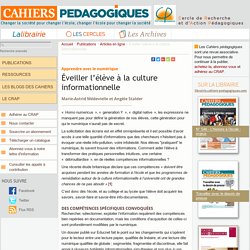
La sollicitation des écrans est en effet omniprésente et il est possible d’avoir accès à une telle quantité d’informations que des chercheurs n’hésitent pas à évoquer une réelle info-pollution, voire infobésité. Nos élèves "pratiquent" le numérique, ils savent trouver des informations. Comment aider l’élève à transformer des pratiques personnelles intuitives, une certaine « débrouillardise », en de réelles compétences informationnelles ? Une récente étude britannique déclare que ces compétences « doivent être acquises pendant les années de formation à l’école et que les programmes de remédiation autour de la culture informationnelle à l’université ont de grandes chances de ne pas aboutir » [1] Des compétences spécifiques convoquées Les notions à acquérir par l’élève.
Information Literacy: Building Blocks of Research: Overview. Building Blocks of Research:Overview of Design, Process and Outcomes.

Home. Online Forums/Hearings. Summer 2014 In Summer 2014, the task force held two open online hearings so that ACRL members and others could share their perspective on the revised draft (draft 2 released June 17, 2014) of the Framework: Monday, July 7, 2014, 11am Pacific/12pm Mountain/1pm Central/2pm Eastern (Watch the recording or download presentation PDF)Friday, July 11, 2014, 8am Pacific/9am Mountain/10am Central/11am Eastern (Watch the recording or download presentation PDF) We also held an in person hearing at the 2014 ALA Annual Conference in Las Vegas (Saturday, June 28, 10:30 am – 11:30 am).
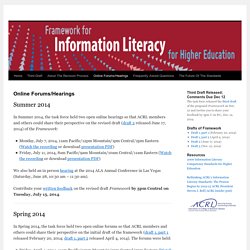
Contribute your written feedback on the revised draft Framework by 5pm Central on Tuesday, July 15, 2014. Spring 2014 In Spring 2014, the task force held two open online forums so that ACRL members and others could share their perspective on the initial draft of the framework (draft 1, part 1 released February 20, 2014; draft 1, part 2 released April 4, 1014). Fall 2013 Q&A from the fall 2013 forums Transitional Period. Information Literacy. What is information literacy?
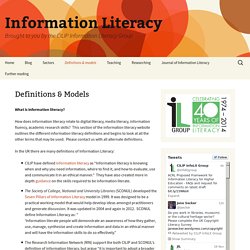
How does information literacy relate to digital literacy, media literacy, information fluency, academic research skills? This section of the information literacy website outlines the different information literacy definitions and begins to look at all the other terms that may be used. Please contact us with all alternate definitions. Journal of Information Literacy. Information Literacy Section. Information literacy standards for teacher education. Approved by the ACRL Board of Directors, May 11, 2011 By the EBSS Instruction for Educators Committee The quickly changing information and technology landscape requires increasingly sophisticated information literacy skills for the navigation, evaluation, and use of information (Jenkins, 2006).

Teachers play a key role in providing students with diverse opportunities to learn how to use information wisely. Those preparing to become prekindergarten to 12th grade (PK–12) teachers require a comprehensive understanding of information literacy to guide their own knowledge creation activities that will ultimately affect their future students. Yet, researchers have shown that future teachers often enter teaching without the necessary information literacy skills and knowledge (Laverty & Reed, 2006). Intended audience Purpose The main purposes of the Information Literacy Standards for Teacher Education are to: Sources consulted Development process Standard One. Performance Indicators: A. B. C. D. A. Information Literacy Competency Standards for Higher Education.
The Information Literacy Competency Standards for Higher Education (originally approved in 2000) were rescinded by the ACRL Board of Directors on June 25, 2016, at the 2016 ALA Annual Conference in Orlando, Florida, which means they are no longer in force.
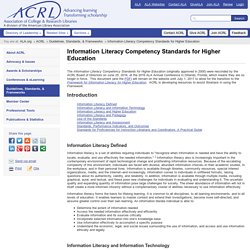
This document (and the PDF) will remain on the website until July 1, 2017 to allow for the transition to the Framework for Information Literacy for Higher Education. ACRL is developing resources to assist librarians in using the Framework.